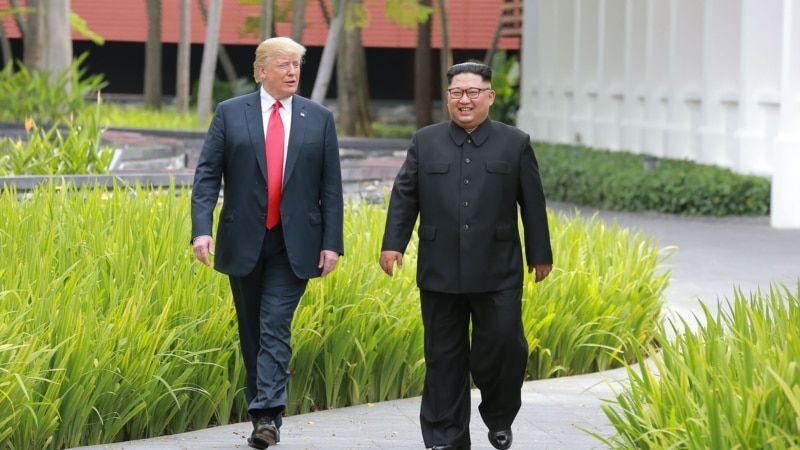A re-elected U.S. President Donald Trump could well awaken the following day to a phone call inviting him to Pyongyang for a summit with Kim Jong Un, says a veteran of the two previous Trump-Kim summits in 2018 and 2019.
“If I were Kim Jong Un talking to my advisers in Pyongyang, I’d be thinking of whether I [should] call President-elect Trump the day after the election to congratulate him” and say, “Why don’t you come to Pyongyang? Let’s meet here,” says former Trump adviser John Bolton.
“And Trump might do it,” continued Bolton in an interview with VOA’s Korean Service on Friday.
Bolton served as national security adviser during the period in which Trump and Kim exchanged frequent letters and conducted summits in Singapore in June 2018 and Hanoi in February 2019, as well as an impromptu meeting at the inter-Korean border in June 2019.
The Hanoi summit broke down when Trump walked away from Kim’s offer to dismantle North Korea’s main nuclear plant at Yongbyon in exchange for sanctions relief, and Kim has refused to engage with the United States or South Korea since U.S.-North Korean talks broke down in Stockholm eight months later.
But Bolton said that does not rule out the possibility that Kim might try again, or that Trump might accept.
“The danger with another Trump administration is he prizes making deals more than the substance of the deals, which he often doesn’t understand in the international context,” said Bolton, who has frequently criticized the former president’s approach to foreign affairs since leaving his administration.
Gary Samore, former White House coordinator for arms control and weapons of mass destruction during the Obama administration, told VOA via phone on Friday, “Kim Jong Un may very well believe that if there’s another summit, he can persuade Trump to lift international economic sanctions” and “weaken the U.S.-ROK [South Korea] alliance as Trump did in the Singapore meeting.”
At a news conference following his 2018 summit with Kim in Singapore, Trump announced the U.S. would suspend military drills with South Korea, describing them as “very provocative” and “tremendously expensive.”
Joint exercises resumed, however, under Trump’s successor, President Joe Biden. The U.S. and South Korea are currently holding the annual Freedom Shield exercise. It began on March 4 and will continue through Thursday.
Harry Kazianis, a senior editor at the website 19FortyFive and president of the Rogue States Project, thinks another Trump-Kim summit would be unlikely.
“Right now, North Korea is likely getting billions of dollars a year from Russia to help Putin arm his military in the Ukraine war and likely little sanctions enforcement from China. If those conditions were to hold, Kim has very little to gain from dealing with Trump,” he said.
But, he told VOA via email on Friday, Kim might need to engage with the American leader again if Trump were to bring the war in Ukraine to an end and successfully pressure China to enforce sanctions.
Scott Snyder, director of the program on U.S.-Korea policy at the Council on Foreign Relations, said via email on Friday that Pyongyang has made clear it is not interested in talks.
For diplomacy to resume, he said “both sides would have to find a way of putting the Hanoi experience behind them and establishing a new modus vivendi and mutually beneficial rationales for pursuing a new relationship.”
Sangjin Cho contributed to this report.

